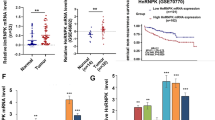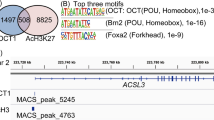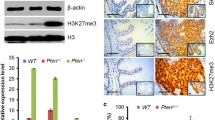Abstract
Purpose
Prostate cancer (PC) is a heterogeneous malignancy that greatly threatens man’s health. E3 ubiquitin-protein ligase neural precursor cell expressed developmentally downregulated 4-like (NEDD4L) imparts an regulatory role in various malignancies. This study focused on the modulatory mechanism of NEDD4L in proliferation of prostate cancer cells (PCCs) via regulating histone demethylase plant homeodomain finger protein 8 (PHF8/KDM7B) through the ubiquitin–proteasome system.
Methods
The expression levels of NEDD4L, PHF8, H3 lysine 9 dimethylation (H3K9me2) and activating transcription factor 2 (ATF2) in PC tissues and cell lines were detected via real-time quantitative polymerase chain reaction and Western blotting. After transfection of pcDNA3.1-NEDD4L, pcDNA3.1-PHF8, and pcDNA3.1-ATF2 into PCCs, cell proliferation was assessed via the cell counting kit-8 and 5-ethynyl-2'-deoxyuridine assays. Interaction between NEDD4L and PHF8 was identified via the protein immunoprecipitation. The ubiquitination level of PHF8 was determined via the ubiquitination detection. The enrichments of H3K9me2 and PHF8 in the ATF2 promotor region were detected via the chromatin-immunoprecipitation assay.
Results
PHF8 and ATF2 were highly expressed while NEDD4L was poorly expressed in PC tissues and cells. NEDD4L overexpression reduced proliferation of PCCs. NEDD4Linduced degradation of PHF8 via ubiquitination. PHF8 limited the enrichment of H3K9me2 in the ATF2 promotor region and enhanced ATF2 transcription. Upregulation of PHF8 or ATF2 abolished the inhibitory role of NEDD4L in proliferation of PCCs.
Conclusion
NEDD4L facilitated degradation of PHF8 to limit ATF2 transcription, thereby suppressing proliferation of PCCs.







Similar content being viewed by others
Data availability
The datasets generated during and/or analysed during the current study are available from the corresponding author on reasonable request. Funding This work was supported by the Scientific Research Funding Project of Soochow University (Grant number 201900180034).
References
Sandhu S, Moore CM, Chiong E, Beltran H, Bristow RG, Williams SG. Prostate cancer. Lancet. 2021;398(10305):1075–90.
Wang G, Zhao D, Spring DJ, DePinho RA. Genetics and biology of prostate cancer. Genes Dev. 2018;32(17–18):1105–40.
Mansour MA. Ubiquitination: friend and foe in cancer. Int J Biochem Cell Biol. 2018;101:80–93.
Rape M. Ubiquitylation at the crossroads of development and disease. Nat Rev Mol Cell Biol. 2018;19(1):59–70.
Xie S, Xia L, Song Y, Liu H, Wang ZW, Zhu X. Insights into the biological role of NEDD4L E3 ubiquitin ligase in human cancers. Front Oncol. 2021;11: 774648.
Jiang X, Zhang S, Yin Z, Sheng Y, Yan Q, Sun R, Lu M, Zhang Z, Li Y. The correlation between NEDD4L and HIF-1alpha levels as a gastric cancer prognostic marker. Int J Med Sci. 2019;16(11):1517–24.
Lee DE, Yoo JE, Kim J, Kim S, Kim S, Lee H, Cheong H. NEDD4L downregulates autophagy and cell growth by modulating ULK1 and a glutamine transporter. Cell Death Dis. 2020;11(1):38.
Hu XY, Xu YM, Fu Q, Yu JJ, Huang J. Nedd4L expression is downregulated in prostate cancer compared to benign prostatic hyperplasia. Eur J Surg Oncol. 2009;35(5):527–31.
Chaturvedi SS, Ramanan R, Waheed SO, Karabencheva-Christova TG, Christov CZ. Structure-function relationships in KDM7 histone demethylases. Adv Protein Chem Struct Biol. 2019;117:113–25.
Hu Y, Mu H, Yang Y. Histone demethylase PHF8 promotes cell growth and metastasis of non-small-cell lung cancer through activating Wnt/beta-catenin signaling pathway. Histol Histopathol. 2021;36(8):869–77.
Cai MZ, Wen SY, Wang XJ, Liu Y, Liang H. MYC regulates PHF8, which promotes the progression of gastric cancer by suppressing miR-22-3p. Technol Cancer Res Treat. 2020;19:1533033820967472.
Ye H, Yang Q, Qi S, Li H. PHF8 Plays an Oncogene Function in Hepatocellular Carcinoma Formation. Oncol Res. 2019;27(5):613–21.
Liu Q, Pang J, Wang LA, Huang Z, Xu J, Yang X, Xie Q, Huang Y, Tang T, Tong D, Liu G, Wang L, Zhang D, Ma Q, Xiao H, Lan W, Qin J, Jiang J. Histone demethylase PHF8 drives neuroendocrine prostate cancer progression by epigenetically upregulating FOXA2. J Pathol. 2021;253(1):106–18.
Wang Q, Ma S, Song N, Li X, Liu L, Yang S, Ding X, Shan L, Zhou X, Su D, Wang Y, Zhang Q, Liu X, Yu N, Zhang K, Shang Y, Yao Z, Shi L. Stabilization of histone demethylase PHF8 by USP7 promotes breast carcinogenesis. J Clin Invest. 2016;126(6):2205–20.
Chen M, Liu Y, Yang Y, Qiu Y, Wang Z, Li X, Zhang W. Emerging roles of activating transcription factor (ATF) family members in tumourigenesis and immunity: implications in cancer immunotherapy. Genes Dis. 2022;9(4):981–99.
Xiaoli T, Wenting W, Meixiang Z, Chunlei Z, Chengxia H. Long noncoding RNA RP11–357H14.17 plays an oncogene role in gastric cancer by activating ATF2 signaling and enhancing treg cells. Biomed Res Int. 2021;2021:6635936.
Shen YY, Cui JY, Yuan J, Wang X. MiR-451a suppressed cell migration and invasion in non-small cell lung cancer through targeting ATF2. Eur Rev Med Pharmacol Sci. 2018;22(17):5554–61.
Inoue S, Mizushima T, Ide H, Jiang G, Goto T, Nagata Y, Netto GJ, Miyamoto H. ATF2 promotes urothelial cancer outgrowth via cooperation with androgen receptor signaling. Endocr Connect. 2018;7(12):1397–408.
Ma J, Chang K, Peng J, Shi Q, Gan H, Gao K, Feng K, Xu F, Zhang H, Dai B, Zhu Y, Shi G, Shen Y, Zhu Y, Qin X, Li Y, Zhang P, Ye D, Wang C. SPOP promotes ATF2 ubiquitination and degradation to suppress prostate cancer progression. J Exp Clin Cancer Res. 2018;37(1):145.
Chen C, Aihemaiti M, Zhang X, Qu H, Sun QL, He QS, Yu WB. Downregulation of histone demethylase JMJD1C inhibits colorectal cancer metastasis through targeting ATF2. Am J Cancer Res. 2018;8(5):852–65.
Livak KJ, Schmittgen TD. Analysis of relative gene expression data using real-time quantitative PCR and the 2(-Delta Delta C(T)) Method. Methods. 2001;25(4):402–8.
Ma Q, Chen Z, Jia G, Lu X, Xie X, Jin W. The histone demethylase PHF8 promotes prostate cancer cell growth by activating the oncomiR miR-125b. Onco Targets Ther. 2015;8:1979–88.
Tong D, Liu Q, Liu G, Yuan W, Wang L, Guo Y, Lan W, Zhang D, Dong S, Wang Y, Xiao H, Mu J, Mao C, Wong J, Jiang J. The HIF/PHF8/AR axis promotes prostate cancer progression. Oncogenesis. 2016;5(12): e283.
Geng L, Chen X, Zhang M, Luo Z. Ubiquitin-specific protease 14 promotes prostate cancer progression through deubiquitinating the transcriptional factor ATF2. Biochem Biophys Res Commun. 2020;524(1):16–21.
Erratum: Global cancer statistics (2018). GLOBOCAN estimates of incidence and mortality worldwide for 36 cancers in 185 countries. CA Cancer J Clin. 2020;70(4):313.
Fujita Y, Tinoco R, Li Y, Senft D, Ronai ZA. Ubiquitin ligases in cancer immunotherapy - balancing antitumor and autoimmunity. Trends Mol Med. 2019;25(5):428–43.
Senft D, Qi J, Ronai ZA. Ubiquitin ligases in oncogenic transformation and cancer therapy. Nat Rev Cancer. 2018;18(2):69–88.
Conteduca V, Hess J, Yamada Y, Ku SY, Beltran H. Epigenetics in prostate cancer: clinical implications. Transl Androl Urol. 2021;10(7):3104–16.
Crea F, Sun L, Mai A, Chiang YT, Farrar WL, Danesi R, Helgason CD. The emerging role of histone lysine demethylases in prostate cancer. Mol Cancer. 2012;11:52.
Chen C, Matesic LE. The Nedd4-like family of E3 ubiquitin ligases and cancer. Cancer Metastasis Rev. 2007;26(3–4):587–604.
Cardano M, Tribioli C, Prosperi E. Targeting proliferating cell nuclear antigen (PCNA) as an effective strategy to inhibit tumor cell proliferation. Curr Cancer Drug Targets. 2020;20(4):240–52.
Dillehay KL, Lu S, Dong Z. Antitumor effects of a novel small molecule targeting PCNA chromatin association in prostate cancer. Mol Cancer Ther. 2014;13(12):2817–26.
Lu S, Dong Z. Additive effects of a small molecular PCNA inhibitor PCNA-I1S and DNA damaging agents on growth inhibition and DNA damage in prostate and lung cancer cells. PLoS ONE. 2019;14(10): e0223894.
Qi H, Grenier J, Fournier A, Labrie C. Androgens differentially regulate the expression of NEDD4L transcripts in LNCaP human prostate cancer cells. Mol Cell Endocrinol. 2003;210(1–2):51–62.
Wang Y, Qin T, Hu W, Chen B, Dai M, Xu G. Genome-wide methylation patterns in androgen-independent prostate cancer cells: a comprehensive analysis combining MeDIP-Bisulfite, RNA, and microRNA sequencing data. Genes (Basel). 2018;9(1):32.
Kypta RM, Waxman J. Wnt/beta-catenin signalling in prostate cancer. Nat Rev Urol. 2012;9(8):418–28.
He Y, Xu W, Xiao YT, Huang H, Gu D, Ren S. Targeting signaling pathways in prostate cancer: mechanisms and clinical trials. Signal Transduct Target Ther. 2022;7(1):198.
Tanksley JP, Chen X, Coffey RJ. NEDD4L is downregulated in colorectal cancer and inhibits canonical WNT signaling. PLoS ONE. 2013;8(11): e81514.
Chen KC, Chen PH, Ho KH, Shih CM, Chou CM, Cheng CH, Lee CC. IGF-1-enhanced miR-513a-5p signaling desensitizes glioma cells to temozolomide by targeting the NEDD4L-inhibited Wnt/beta-catenin pathway. PLoS ONE. 2019;14(12): e0225913.
Wang Y, Liu Y, Liu J, Kang R, Tang D. NEDD4L-mediated LTF protein degradation limits ferroptosis. Biochem Biophys Res Commun. 2020;531(4):581–7.
Zhang R, Zhang W, Zeng Y, Li Y, Zhou J, Zhang Y, Wang A, Lv Y, Zhu J, Liu Z, Huang JA. The regulation of CPNE1 ubiquitination by the NEDD4L is involved in the pathogenesis of non-small cell lung cancer. Cell Death Discov. 2021;7(1):336.
Lim HJ, Dimova NV, Tan MK, Sigoillot FD, King RW, Shi Y. The G2/M regulator histone demethylase PHF8 is targeted for degradation by the anaphase-promoting complex containing CDC20. Mol Cell Biol. 2013;33(21):4166–80.
Maina PK, Shao P, Jia X, Liu Q, Umesalma S, Marin M, Long D Jr, Concepcion-Roman S, Qi HH. Histone demethylase PHF8 regulates hypoxia signaling through HIF1alpha and H3K4me3. Biochim Biophys Acta Gene Regul Mech. 2017;1860(9):1002–12.
Maina PK, Shao P, Liu Q, Fazli L, Tyler S, Nasir M, Dong X, Qi HH. c-MYC drives histone demethylase PHF8 during neuroendocrine differentiation and in castration-resistant prostate cancer. Oncotarget. 2016;7(46):75585–602.
Li N, Guo X, Liu L, Wang L, Cheng R. Molecular mechanism of miR-204 regulates proliferation, apoptosis and autophagy of cervical cancer cells by targeting ATF2. Artif Cells Nanomed Biotechnol. 2019;47(1):2529–35.
Li M, Wu X, Liu N, Li X, Meng F, Song S. Silencing of ATF2 inhibits growth of pancreatic cancer cells and enhances sensitivity to chemotherapy. Cell Biol Int. 2017;41(6):599–610.
Giannoudis A, Malki MI, Rudraraju B, Mohhamed H, Menon S, Liloglou T, Ali S, Carroll JS, Palmieri C. Activating transcription factor-2 (ATF2) is a key determinant of resistance to endocrine treatment in an in vitro model of breast cancer. Breast Cancer Res. 2020;22(1):126.
Lo Iacono M, Monica V, Vavala T, Gisabella M, Saviozzi S, Bracco E, Novello S, Papotti M, Scagliotti GV. ATF2 contributes to cisplatin resistance in non-small cell lung cancer and celastrol induces cisplatin resensitization through inhibition of JNK/ATF2 pathway. Int J Cancer. 2015;136(11):2598–609.
Kawasaki H, Schiltz L, Chiu R, Itakura K, Taira K, Nakatani Y, Yokoyama KK. ATF-2 has intrinsic histone acetyltransferase activity which is modulated by phosphorylation. Nature. 2000;405(6783):195–200.
Bruhat A, Cherasse Y, Maurin AC, Breitwieser W, Parry L, Deval C, Jones N, Jousse C, Fafournoux P. ATF2 is required for amino acid-regulated transcription by orchestrating specific histone acetylation. Nucleic Acids Res. 2007;35(4):1312–21.
Zhang S, Dong X, Ji T, Chen G, Shan L. Long non-coding RNA UCA1 promotes cell progression by acting as a competing endogenous RNA of ATF2 in prostate cancer. Am J Transl Res. 2017;9(2):366–75.
Hellwinkel OJ, Asong LE, Rogmann JP, Sultmann H, Wagner C, Schlomm T, Eichelberg C. Transcription alterations of members of the ubiquitin-proteasome network in prostate carcinoma. Prostate Cancer Prostatic Dis. 2011;14(1):38–45.
Huang Z, Choi BK, Mujoo K, Fan X, Fa M, Mukherjee S, Owiti N, Zhang N, An Z. The E3 ubiquitin ligase NEDD4 negatively regulates HER3/ErbB3 level and signaling. Oncogene. 2015;34(9):1105–15.
Author information
Authors and Affiliations
Contributions
Conceptualization: RF, ZL, GG, and JO; methodology: RF, CW, and JO; data curation: RF and ZL; validation: GG and YJ; writing—original draft: RF; writing—review and editing: RF, ZL, GG, CW, YJ, and JO.
Corresponding author
Ethics declarations
Conflict of interest
All authors have no conflicts of interest.
Ethical approval
The present experimental protocols were permitted to be conducted with the approval of the Clinical Research Ethics Committee of The First Affiliated Hospital of Soochow University.
Informed consent
Each patient signed an informed consent.
Consent for publication
This article has been read and approved in the present form for submission by all authors.
Additional information
Publisher's Note
Springer Nature remains neutral with regard to jurisdictional claims in published maps and institutional affiliations.
Rights and permissions
Springer Nature or its licensor holds exclusive rights to this article under a publishing agreement with the author(s) or other rightsholder(s); author self-archiving of the accepted manuscript version of this article is solely governed by the terms of such publishing agreement and applicable law.
About this article
Cite this article
Feng, R., Li, Z., Ge, G. et al. NEDD4L represses prostate cancer cell proliferation via modulating PHF8 through the ubiquitin–proteasome pathway. Clin Transl Oncol 25, 243–255 (2023). https://doi.org/10.1007/s12094-022-02933-5
Received:
Accepted:
Published:
Issue Date:
DOI: https://doi.org/10.1007/s12094-022-02933-5




